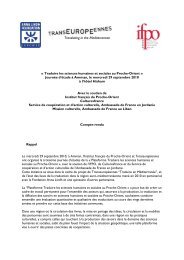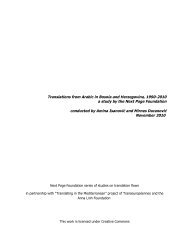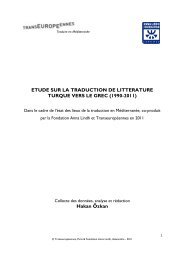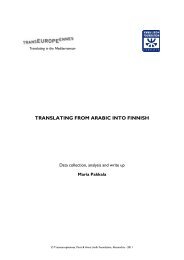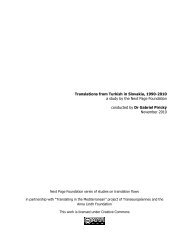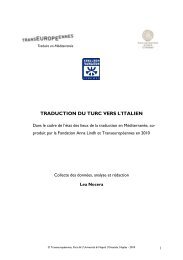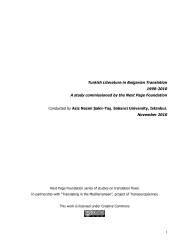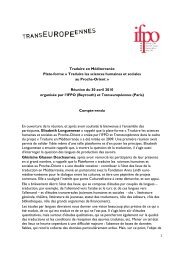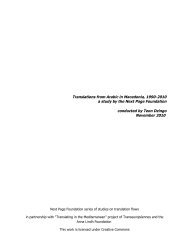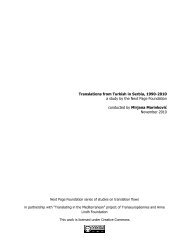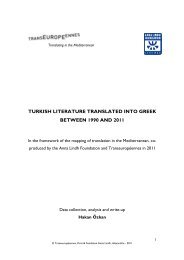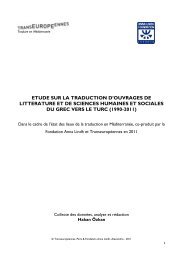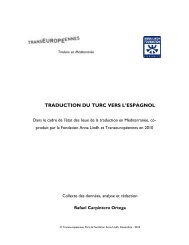TIM 2010 EastEuro-Arabic Next Page Foundation - Transeuropéennes
TIM 2010 EastEuro-Arabic Next Page Foundation - Transeuropéennes
TIM 2010 EastEuro-Arabic Next Page Foundation - Transeuropéennes
- No tags were found...
Create successful ePaper yourself
Turn your PDF publications into a flip-book with our unique Google optimized e-Paper software.
Polish translations of poems by Czesław Miłosz, Tadeusz Różewicz, Wisława Szymborska,Zbigniew Herbert, and many others translated by Hātif al-Janābi appear in variousperiodicals such as Aṯ-Ṯaqāfa al-aǧnabiyya (Baghdad), Barīd al-Ǧanūb (Paris), An-Nahǧ(Damascus), Al-Madā (Damascus), Faradis (Paris), and others. Some translations, poemsand short stories can be found on the Internet, primarily on the cultural siteswww.elaph.com and www.adabfan.com or on the sites of magazines such aswww.nizwa.com (Oman) and www.alarabimag.com (Kuwait). Translations of Polish plays byIreneusz Iredyński, Sławomir Mrożek, Tadeusz Różewicz and Witold Gombrowicz have beenpublished in periodicals such as Al-Aqlām or Ath-Thaqāfa al-Ajnabīya (Iraq), Nizwa (Oman),and others.3.4. The role of the immigrant and expatriate communitiesContrary to what one might assume, migrants between CEE and the Arab world in bothdirections do not play a decisive role in boosting translations. This is due to the fact that thiskind of migration is typically labour migration or is related to receiving education in thetechnical or hard sciences. While migrant communities do have a role to play in sustainingbusiness and cultural relations between the countries, they are usually not sufficientlyequipped for or interested in pursuing a career in publishing or translation.One notable exception is the publisher Dar Ibn Rushd, which was founded in 1991 in Praguewith the original intention of publishing literature from the “Orient”. It publishes textbookson Oriental languages, dictionaries, translations of literary works, but also works by Czechauthors and journalists related to its publishing focus. Its owner, Charif Bahbouh, is also atranslator from and into <strong>Arabic</strong> who has already published his translation of Czech shortstories and tales and is planning to publish more literary works.4. Notes and bibliographies by countryBosnian into <strong>Arabic</strong>Bosnia and Herzegovina has a special position vis-à-vis the <strong>Arabic</strong> language. Compared tothe other countries in Southeast Europe, the position of Oriental languages (<strong>Arabic</strong>, Turkishand Persian) within the cultural context of BiH is fairly distinctive. The presence of thoselanguages can be traced back to the period of Ottoman rule (1463-1878) in the country.Over the centuries, Bosnia was plurilingual in many regards; besides Bosnian, several otherlanguages circulated throughout its cultural area, not only those belonging to the Orientalmilieu, but also Latin, German, Church Slavonic and, to some extent, Italian. Over the courseof Ottoman rule in Bosnia, Turkish was considered the language of administration, Persianthe language of poetry, while <strong>Arabic</strong> was predominantly used in scholarly works on theology,philosophy, philology, and science, apart from being the language of Muslims’ religiousrituals and their Holy Book. As the result of the particular influence of <strong>Arabic</strong>, a specific formof literature was developed in the 17 th century, known as alhamijado (Spanish: aljamiado)literature. Works belonging to this group are Bosnian popular language texts written in<strong>Arabic</strong> script. Bosnians writing in the <strong>Arabic</strong> language (predominantly Bosnian Muslims, i.e.Bosniaks) also prominently contributed to the intellectual development of Islamic civilization.Works produced in Oriental languages in Bosnia are regarded as a corpus of enormoussignificance for literary, historical, juridical and other studies.11



